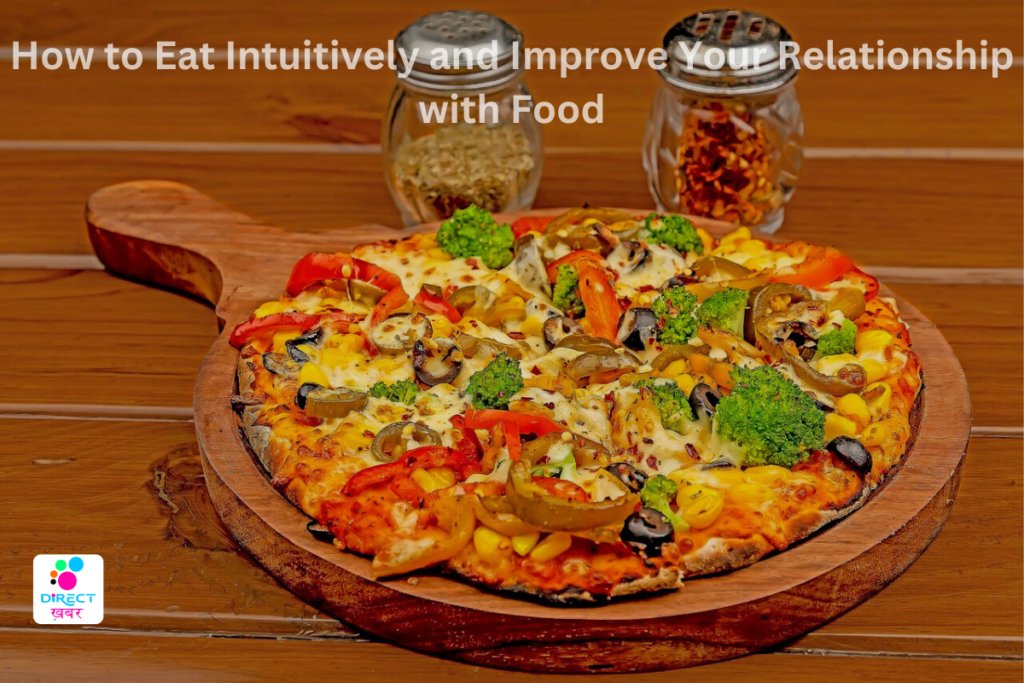How to Eat Intuitively and Improve Your Relationship with Food
In today’s fast-paced world, many of us have developed unhealthy habits when it comes to eating. We often eat on the go, mindlessly consume processed foods, or use food as a coping mechanism for stress or emotions. This can lead to disordered eating patterns, weight gain, and a strained relationship with food. However, by practicing mindful eating, we can cultivate a more positive and intuitive approach to nourishing our bodies. Here are some strategies to help you eat intuitively and improve your relationship with food:

https://www.canva.com/design/DAF7wekCTUc/
1. Tune into Your Body’s Hunger Cues: One of the key principles of mindful eating is learning to listen to your body’s hunger and fullness signals. Pay attention to physical hunger cues such as stomach growling, lightheadedness, or low energy levels. Eat when you’re hungry and stop when you’re satisfied, rather than relying on external cues or arbitrary meal times.
2. Eat with Awareness: Mindful eating involves being fully present and engaged with your food. Avoid distractions such as television, smartphones, or work while eating. Instead, savor each bite, paying attention to the flavors, textures, and sensations of the food. Eating slowly and mindfully can enhance the enjoyment of your meals and help prevent overeating.
3. Practice Non-Judgmental Awareness: Approach food without judgment or guilt. There are no “good” or “bad” foods—instead, focus on nourishing your body with a variety of whole, nutrient-dense foods while still allowing yourself to enjoy your favorite treats in moderation. Be kind to yourself and let go of unrealistic expectations or restrictive eating habits.
4. Cultivate Gratitude: Take a moment before eating to express gratitude for the food on your plate and the nourishment it provides. Acknowledge the effort that went into growing, harvesting, and preparing the food, and savor each bite with appreciation. Cultivating gratitude can enhance the enjoyment of your meals and foster a deeper connection to the food you eat.
5. Listen to Your Cravings: Honor your body’s cravings and desires without judgment. Cravings are often our body’s way of communicating its needs, whether it’s for a particular nutrient or simply for comfort or pleasure. Instead of suppressing or ignoring cravings, explore healthier ways to satisfy them or allow yourself to indulge occasionally without guilt.
6. Practice Mindful Meal Planning: Take the time to plan and prepare balanced meals that nourish your body and satisfy your taste buds. Include a variety of colorful fruits and vegetables, whole grains, lean proteins, and healthy fats in your meals to ensure you’re getting a wide range of nutrients. Experiment with new recipes and flavors to keep meals exciting and enjoyable.
7. Cultivate Mindful Eating Habits: Incorporate mindfulness into your eating habits beyond mealtime. Practice mindful grocery shopping by choosing fresh, whole foods and avoiding impulse purchases. Pay attention to portion sizes and serve yourself appropriate portions rather than eating straight from the package. Additionally, practice mindful cooking by engaging all your senses while preparing meals and savoring the aromas and textures of the ingredients.
8. Manage Emotional Eating: Learn to distinguish between physical hunger and emotional hunger. If you find yourself turning to food for comfort, stress relief, or boredom, pause and check in with yourself before eating. Explore alternative coping strategies such as journaling, meditating, going for a walk, or reaching out to a supportive friend or therapist.

9. Be Flexible and Adaptive: Remember that mindful eating is not about perfection—it’s about finding balance and flexibility in your relationship with food. Allow yourself to be adaptable and responsive to your body’s changing needs, preferences, and circumstances. Some days you may eat more mindfully than others, and that’s okay. The goal is progress, not perfection.
10. Seek Support and Guidance: If you’re struggling with disordered eating patterns or a negative relationship with food, don’t hesitate to seek support from a qualified healthcare professional, such as a registered dietitian, therapist, or counselor. They can provide personalized guidance, support, and resources to help you cultivate a healthier relationship with food and eating.
In conclusion, mindful eating is a powerful practice that can help you reconnect with your body, cultivate a positive relationship with food, and improve your overall wellbeing. By tuning into your body’s hunger cues, eating with awareness, practicing non-judgmental awareness, cultivating gratitude, listening to your cravings, mindful meal planning, cultivating mindful eating habits, managing emotional eating, being flexible and adaptive, and seeking support and guidance, you can embrace a more intuitive and nourishing approach to eating. Start incorporating these strategies into your daily life and watch as your relationship with food and eating transforms for the better.






